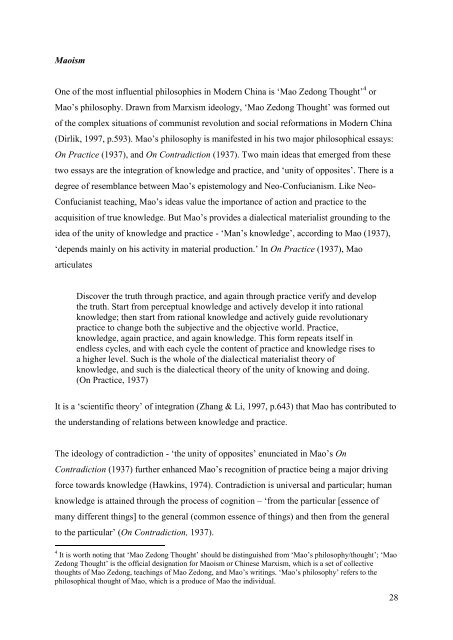The challenge of academic writing for Chinese students within ...
The challenge of academic writing for Chinese students within ...
The challenge of academic writing for Chinese students within ...
Create successful ePaper yourself
Turn your PDF publications into a flip-book with our unique Google optimized e-Paper software.
Maoism<br />
One <strong>of</strong> the most influential philosophies in Modern China is ‗Mao Zedong Thought‘ 4 or<br />
Mao‘s philosophy. Drawn from Marxism ideology, ‗Mao Zedong Thought‘ was <strong>for</strong>med out<br />
<strong>of</strong> the complex situations <strong>of</strong> communist revolution and social re<strong>for</strong>mations in Modern China<br />
(Dirlik, 1997, p.593). Mao‘s philosophy is manifested in his two major philosophical essays:<br />
On Practice (1937), and On Contradiction (1937). Two main ideas that emerged from these<br />
two essays are the integration <strong>of</strong> knowledge and practice, and ‗unity <strong>of</strong> opposites‘. <strong>The</strong>re is a<br />
degree <strong>of</strong> resemblance between Mao‘s epistemology and Neo-Confucianism. Like Neo-<br />
Confucianist teaching, Mao‘s ideas value the importance <strong>of</strong> action and practice to the<br />
acquisition <strong>of</strong> true knowledge. But Mao‘s provides a dialectical materialist grounding to the<br />
idea <strong>of</strong> the unity <strong>of</strong> knowledge and practice - ‗Man‘s knowledge‘, according to Mao (1937),<br />
‗depends mainly on his activity in material production.‘ In On Practice (1937), Mao<br />
articulates<br />
Discover the truth through practice, and again through practice verify and develop<br />
the truth. Start from perceptual knowledge and actively develop it into rational<br />
knowledge; then start from rational knowledge and actively guide revolutionary<br />
practice to change both the subjective and the objective world. Practice,<br />
knowledge, again practice, and again knowledge. This <strong>for</strong>m repeats itself in<br />
endless cycles, and with each cycle the content <strong>of</strong> practice and knowledge rises to<br />
a higher level. Such is the whole <strong>of</strong> the dialectical materialist theory <strong>of</strong><br />
knowledge, and such is the dialectical theory <strong>of</strong> the unity <strong>of</strong> knowing and doing.<br />
(On Practice, 1937)<br />
It is a ‗scientific theory‘ <strong>of</strong> integration (Zhang & Li, 1997, p.643) that Mao has contributed to<br />
the understanding <strong>of</strong> relations between knowledge and practice.<br />
<strong>The</strong> ideology <strong>of</strong> contradiction - ‗the unity <strong>of</strong> opposites‘ enunciated in Mao‘s On<br />
Contradiction (1937) further enhanced Mao‘s recognition <strong>of</strong> practice being a major driving<br />
<strong>for</strong>ce towards knowledge (Hawkins, 1974). Contradiction is universal and particular; human<br />
knowledge is attained through the process <strong>of</strong> cognition – ‗from the particular [essence <strong>of</strong><br />
many different things] to the general (common essence <strong>of</strong> things) and then from the general<br />
to the particular‘ (On Contradiction, 1937).<br />
4 It is worth noting that ‗Mao Zedong Thought‘ should be distinguished from ‗Mao‘s philosophy/thought‘; ‗Mao<br />
Zedong Thought‘ is the <strong>of</strong>ficial designation <strong>for</strong> Maoism or <strong>Chinese</strong> Marxism, which is a set <strong>of</strong> collective<br />
thoughts <strong>of</strong> Mao Zedong, teachings <strong>of</strong> Mao Zedong, and Mao‘s <strong>writing</strong>s. ‗Mao‘s philosophy‘ refers to the<br />
philosophical thought <strong>of</strong> Mao, which is a produce <strong>of</strong> Mao the individual.<br />
28


